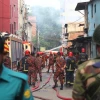After a 35-year hiatus, students of the University of Chittagong (CU) are casting their votes on Wednesday to elect new representatives to the Central Students’ Union (CUCSU), hall unions, and hostel unions amid a festive atmosphere on campus.
The voting began at 9:30 am at the IT Building, New Arts Building, and the faculties of Science, Social Science, and Business Administration, and will continue until 4 pm. A total of 27,516 students are registered voters in this year’s election.
For CUCSU’s 26 posts, 415 candidates are contesting, including 24 for the vice president (VP) post and 22 for the general secretary (GS) post. In addition, 493 candidates are vying for 206 positions across 14 hall and one hostel unions.
Panels and contenders
A total of 13 panels—both full and partial—are contesting in this year’s polls. The Jatiyatabadi Chhatra Dal is running under its own banner, while Islami Chhatra Shibir is contesting under the title “Sampritir Shikkharthi Jote” (Alliance for Harmony).
Other panels include “Boichitryer Oikko” (Unity in Diversity) led by left-leaning and cultural student organizations, “Droho Parishad” (Council of Dissent) of Chhatra Union and Chhatra Front, “Sochton Shikkharthi Sangsad” (Conscious Students’ Council) of Islami Chhatra Andolon, and “Sorbojonin Shikkharthi Sangsad” (Universal Students’ Council) of Chhatra Adhikar Parishad, among others.
Chowdhury Tasnim Jahan Srabon from “Binirman Shikkharthi Oikko” is the only female candidate for the VP post, while Abir Bin Javed is contesting for the GS post.
Tech-enabled generation’s election
For the first time, the CUCSU election is being held using OMR ballots and transparent ballot boxes, with results to be counted through digital scanning. A separate voting center has been set up for visually impaired students.
According to the university administration, all polling centers are equipped with CCTV cameras. Around 60 security personnel led by assistant proctors have been deployed across the five academic buildings to ensure a smooth voting process.
The last CUCSU election was held in 1989. After more than three decades, students are once again getting the opportunity to choose their own representatives. This year’s campaign was entirely free of banners and posters, with candidates relying on social media and creative approaches for outreach.
Students’ expectations
Students have voiced demands for resolving accommodation shortages, improving transportation facilities, ensuring safety on campus, freeing residence halls from external influence, and expanding research opportunities. They hope the elected representatives will provide real leadership rather than symbolic politics.
This is my first time voting, and I’m doing it consciously,” said Azimul Sakib, a student of Political Science.
Sneha, a student of Fine Arts, added, “It feels great to choose our representatives in such a festive atmosphere.”
Security measures and restricted access
To maintain order, the university authorities have tightened security, closing seven of the 33 entry points to the campus. Police, APBn, and BGB personnel have been deployed to prevent outsiders from entering the area.
We’ve taken all necessary steps to ensure that students can cast their votes peacefully,” said CU Proctor Professor Hossain Shahid Sarwardi.
Concerns over voter turnout
As many CU students live off-campus in the city, candidates have expressed concerns about voter turnout. However, the administration remains hopeful of a significant presence of voters.
If the administration stays neutral, we expect a good election,” said JCD’s GS candidate Md Shafayat Hossain.
Meanwhile, Ibrahim Hossain Rony, VP candidate from the Shibir-backed panel, said, “The campaign ended in a very positive environment, and we’re expecting a fair vote.”
After 35 years, the CUCSU election represents more than just a leadership contest—it marks the revival of democratic practice among a new generation of Chittagong University students.

-1760505460.webp)
 Prev Post :
Prev Post :
